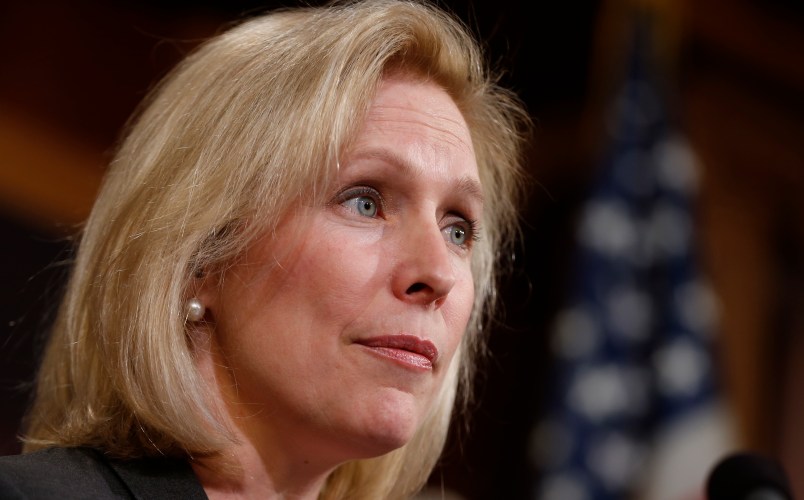A debate broke out on Twitter among three male journalists — New York Times’ Nick Confessore, Politico’s Alex Burns, and MSNBC’s Benjy Sarlin — on Thursday afternoon: Does Sen. Kirsten Gillibrand (D-NY), whose anonymous colleagues she said told her she was “porky,” “chubby,” and “fat” during the months just after she had a baby, have a responsibility to name her harassers? Confessore and Burns say yes, Sarlin says no.
At the risk of being a woman to weigh in on this debate, it seems that the argument here is asking the wrong question. Don’t those men who said those things have a responsibility to step forward, admit what they did, and apologize?
The implication is that Gillibrand dared to talk about sexual harassment, and if she’s going to bring it up, she’d better go all in or risk being branded a liar. What’s missing from this debate is the power dynamics at play. Why would a woman, who works with almost all men every day not want to point fingers at who had done the harassing?
Maybe because it would ruin her career in the U.S. Senate. Even if the harasser paid the price, she’d be accused of ruining his legacy. And how would that play with the other male senators whose vote she may need for her state. Why can’t women make the same political calculations as their male colleagues about which issues to push and when, and which issues to lay low on until the time is right?
The reality is that Gillibrand’s career is far more likely to suffer than the men who said those things. Furthermore, it’s astonishing that the men arguing for Gillibrand to come forward with the names think the harassers would pay a serious price.
Burns wrote, “The behavior she describes is straight-up sexual harassment and would force any male CEO out of his job.”
Forgive me for not being able to suppress laughter. Were this true, we’d probably have far fewer male CEOs than the 97+ percent we currently have, because no matter how rare you believe sexual harassment to be, it’s hard to believe that none of the male CEOs out there have ever harassed anyone. The truth is harassers, even when they’re named, rarely pay a serious price.
It’s like no one has ever heard of Anita Hill.
As Irin Carmon pointed out as the debate got more heated, women often need a safe space to talk about their experiences. Sometimes the only comfort women have is that they know they’re not the only ones who have experienced these things, and I’d wager that’s part of the reason Gillibrand shared these anecdotes in her book. She wanted women everywhere to know that even a powerful U.S. senator has creepy colleagues. That doesn’t make it okay, but it does make women feel less alone.
The simple fact of the matter is that women know harassment happens. And it happens to almost everyone. Get a room full of women together and it won’t be long before they’re swapping stories about this thing or that thing that a male colleague said to her. Most of us just roll our eyes and move on.
In one respect, these male reporters are right, the more we keep sexual harassment a secret that only women share, the more men are shielded from this experience and have reason to doubt that it happens all that often. But bringing forth a lawsuit or making public accusation is a major step, and one that most women realize risks a career or a reputation or both. Men have a greater responsibility not to harass women in the first place than Gillibrand does to name the men who called her “chubby.”
But please, male reporters, tell us more about what the victims of sexual harassment have a “responsibility” to do.






